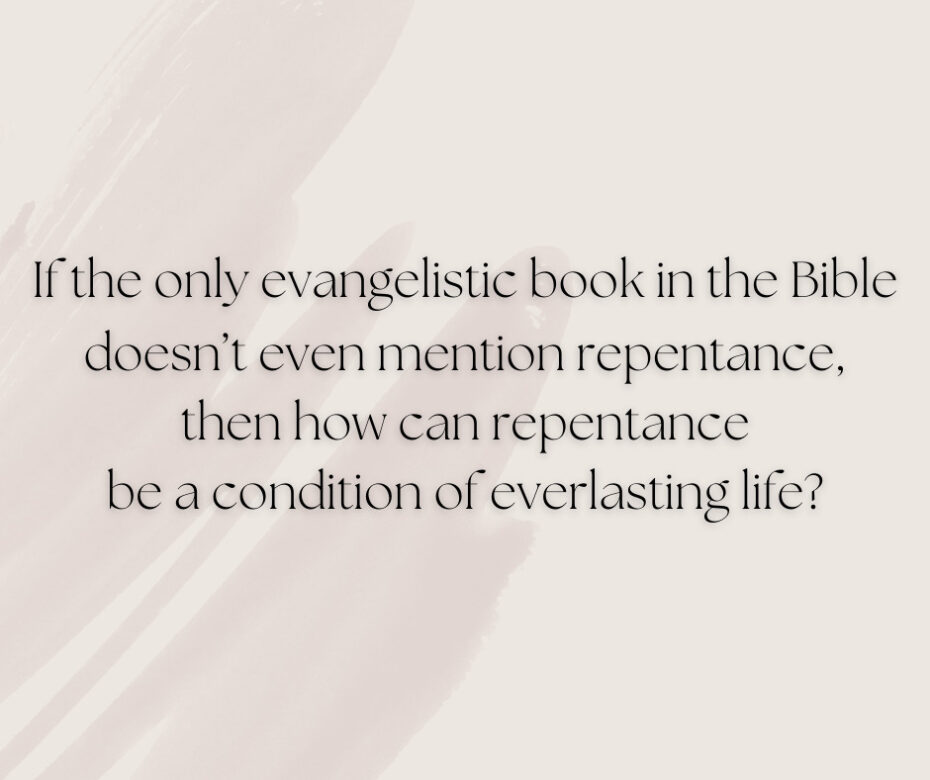Repentance comes up a lot in my email box. J. L. asks a great question about different understandings of repentance:
Can you explain to me in layman’s terms the difference between the change of mind view of repentance and the turning from sins view? I’m not a theologian so I want an easy explanation. Thank you!
There are actually three views:
- Repentance is a condition of everlasting life, and it means turning from sins.
- Repentance is a condition for everlasting life, and it means changing one’s mind about sin, self, and Christ.
- Repentance is not a condition of everlasting life, and it means turning from sins.
I wrote my doctoral dissertation at Dallas Theological Seminary in 1985. I defended the second view. Later, however, I changed my mind about repentance and adopted the third view! See this journal article that explains why and how I changed my mind about repentance and salvation.
View one. The first view teaches that faith in Christ is not the only condition to be born again. One must both believe in Christ and turn away from his sinful ways. The confusing part is what that means.
No one who holds the turn-from-sins view says this means that the person must stop sinning entirely. What they mean is that the person must turn away from all major sins—like drunkenness, drug use, and sexual immorality—as best he can. The identity of those major sins is rarely mentioned. Essentially in this view a person must be determined to turn from sins as God reveals them to him. He must also promise to serve God for the rest of his life.
View two. The second view is simpler, but it too is complicated, only in different ways. In this view, repentance in evangelistic contexts refers to changing one’s mind about three things: sin, self, and Christ. Changing one’s mind about sin and self is understood to mean that I come to believe that I am a sinner in need of salvation. That is not the same as believing in Christ. Changing one’s mind about Christ is understood to be a synonym for believing in Him.
According to view two, repentance includes faith in Christ, but it also has two elements that are not the same as faith in Christ.
Rarely do change-of-mind proponents explain that. How is it that faith in Christ is the only condition for eternal salvation, yet it is not enough? They probably think that changing one’s mind about his sins and himself is a necessary precursor to faith. Those things are not enough to save. But they must be combined with believing in Jesus. That is confusing.
The change-of-mind view is further complicated by the fact that it recognizes that repentance is most often used in contexts that are not evangelistic. In such contexts, the change-of-mind view understands repentance to mean a change of mind about one’s sinful ways. Essentially in those passages the change-of-mind understanding is that repentance is turning from one’s sins. In my dissertation, I argued that 44 of the 55 New Testament uses of repent (metanoeō) and repentance (metanoia) referred to turning from sins. How is someone going to determine which repentance contexts are evangelistic and which are not?
View three. The simplest and easiest to understand view (and the one that best fits the hundred-plus faith-alone verses in the Bible) is that faith in Christ is the sole condition of eternal salvation; repentance is turning from sins (e.g., Matt 12:41, referring to Jonah 3:10), and repentance is not a condition for the new birth. There isn’t a single verse in the Bible that teaches that one must repent to have everlasting life or to be justified. In John 3:16 the Lord said that “whoever believes in Him…has everlasting life.” He said nothing about repentance there, or in John 4:10-26; 5:34, 39-40; 6:35, 47; 11:25-27. In fact, the words repent and repentance are not found even once in John’s Gospel, the only evangelistic book in the Bible (John 20:31). If the only evangelistic book in the Bible doesn’t mention repentance, then how can repentance be a condition of everlasting life?
The sole condition for everlasting life is faith in Christ. See my article cited above on why I changed my mind about repentance, or see my book Turn and Live: The Power of Repentance, for a detailed defense of view three.


